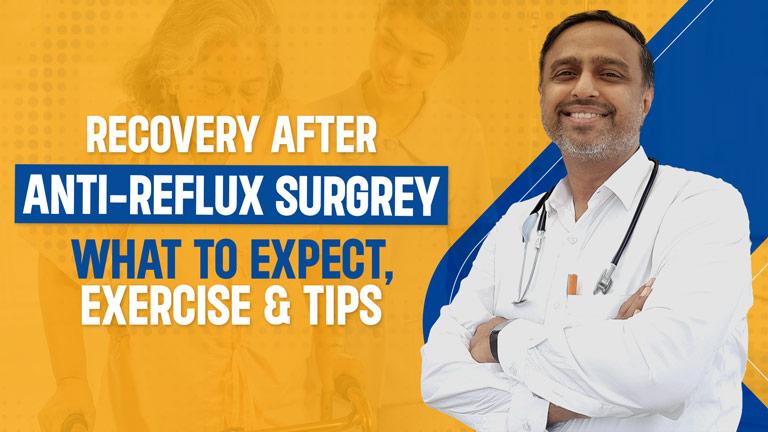After undergoing anti-reflux surgery, it’s important to be vigilant about monitoring your recovery and any potential complications. Recovery after anti-reflux surgery (such as fundoplication) can vary from person to person, but here’s a general overview of what to expect immediately after surgery and some tips for a smoother recovery. We have also curated some simple exercises you can do at home to help with any complications post-anti-reflux surgery.
What happens immediately After Anti-Reflux Surgery:
- Hospital Stay: You will likely spend a few days in the hospital after the surgery. This allows the medical team to monitor your initial recovery and ensure that there are no complications.
- Diet Progression: Your diet will be gradually advanced from clear liquids to soft foods and then to regular foods. Start with liquids and progress to foods that are easy to digest.
- Pain Management: You may experience some discomfort or pain around the surgical site and in your abdomen. Your healthcare team will provide pain management strategies, including medications, to help control any discomfort.
- Activity Level: Initially, you’ll need to limit physical activity and avoid lifting heavy objects.
- Follow-up Appointments: You’ll have several follow-up appointments with your surgeon to monitor your healing progress and address any concerns.
In how many days can I recover after Anti-reflux surgery?
After undergoing GERD surgery, patients are usually required to adhere to a diet consisting of soft foods or liquids. The specifics of these dietary limitations can differ from person to person; however, the majority of patients progressively transition back to a solid diet within a span of 2 to 8 weeks.
What Exercises Can I do at Home After Anti-reflux surgery?
Please note that you should always consult your healthcare provider before starting any exercise regimen after surgery. Here are some gentle exercises that you might consider after receiving clearance from your medical team:
Walking: Start with short, slow walks around your home or outdoors. Gradually increase your walking distance as you feel more comfortable.
Deep Breathing: Practice deep breathing exercises to help improve lung function and prevent complications like pneumonia. Inhale deeply through your nose, and then exhale through your mouth.
Gentle Stretching: Perform gentle stretches to help maintain flexibility and prevent muscle stiffness. Focus on gentle movements and avoid any strain on the surgical area.
Precaution Tips to Follow at Home During Anti-Reflux Recovery Period:
- Drink plenty of fluids to stay hydrated.
- When sleeping, elevate the head of your bed by about 6-8 inches to help reduce nighttime reflux.
- Stick to the dietary guidelines provided by your healthcare team.
- Take prescribed medications.
- Pay attention to any unusual symptoms, such as severe pain, difficulty swallowing, excessive vomiting, or fever.
- Avoid heavy lifting and strenuous activities that could strain your surgical site.
- Give your body adequate time to heal with rest and relaxation.
- If you have questions or concerns, don’t hesitate to reach out to your surgeon or medical team.
Questions to ask doctor post-Anti-reflux surgery
Asking your doctor the right questions after anti-reflux surgery is essential to ensure a smooth recovery and understand what to expect moving forward. Here are some important questions to consider asking your doctor during your post-surgery follow-up appointments:
Immediate Post-Surgery Questions:
- How long can I expect to stay in the hospital after the surgery?
- What is the anticipated recovery time for my specific surgery?
- What kind of pain or discomfort can I expect in the days and weeks following surgery, and how will it be managed?
- Are there any restrictions on movement or lifting during the initial recovery period?
- When can I resume regular activities, such as driving, exercising, and returning to work?
- What medications will I need to take during my recovery, and how long should I continue taking them?
- Can I continue taking my pre-existing medications, and are there any potential interactions with my current regimen?
- How do I differentiate between normal discomfort and potential problems related to the surgery?
Long-Term Outlook:
- What are the expected long-term outcomes of the surgery in terms of reflux control and quality of life?
- Will I need follow-up appointments or tests to monitor my progress and the effectiveness of the surgery?
- Are there any lifestyle modifications, aside from dietary changes, that I should consider to maintain the benefits of the surgery over time?
- How will the surgery impact any pre-existing medical conditions or medications I’m currently taking?
Wrap-up Tips on Anti-reflux Recovery:
Post-operative care is necessary to monitor the patient’s recovery and ensure a safe and successful recovery for the patient. It helps in addressing potential complications, managing pain, and providing necessary guidance for a safe and successful recuperation.
Asking questions to your surgeon and consulting them regularly can help ensure your safety and well-being during the recovery process.






